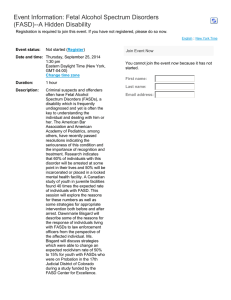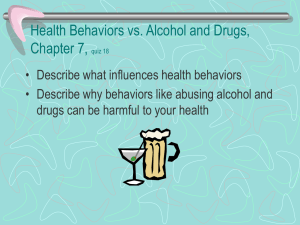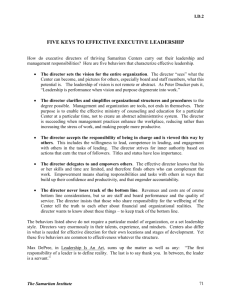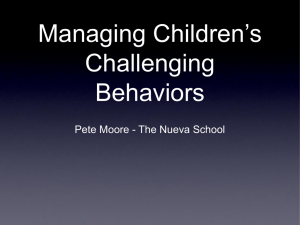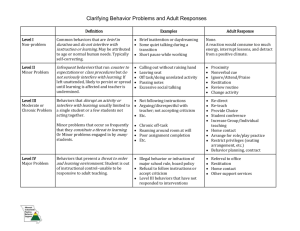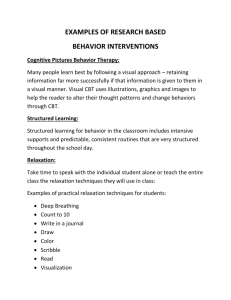Cognitive Behavior Therapy and Fetal Alcohol Spectrum Disorders
advertisement
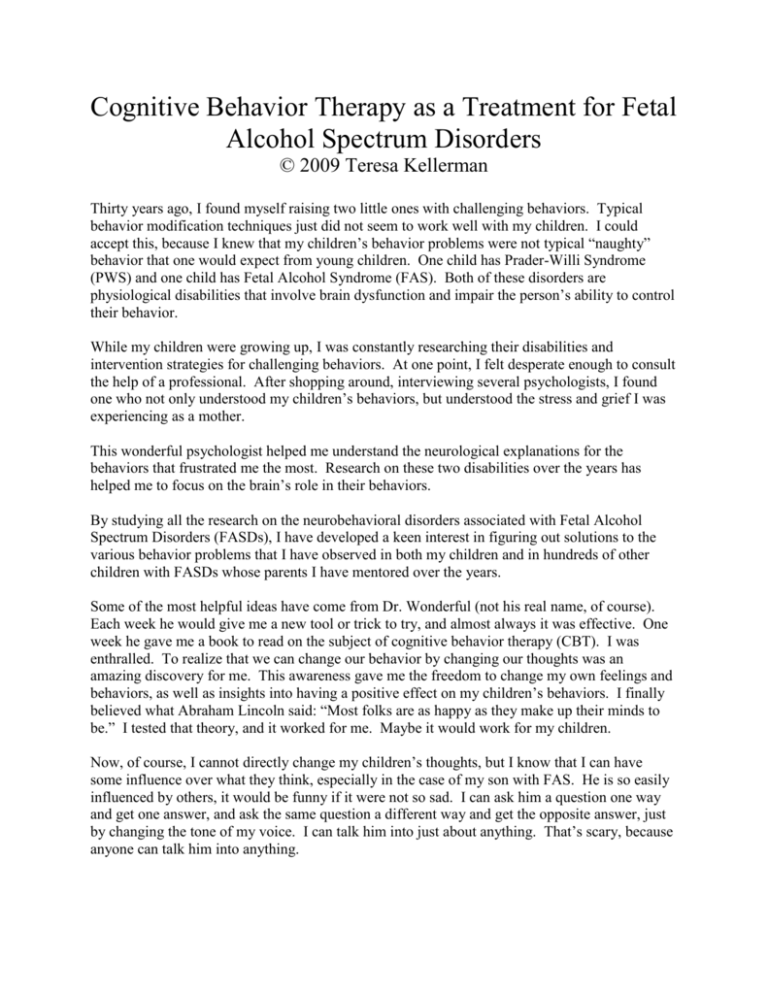
Cognitive Behavior Therapy as a Treatment for Fetal Alcohol Spectrum Disorders © 2009 Teresa Kellerman Thirty years ago, I found myself raising two little ones with challenging behaviors. Typical behavior modification techniques just did not seem to work well with my children. I could accept this, because I knew that my children’s behavior problems were not typical “naughty” behavior that one would expect from young children. One child has Prader-Willi Syndrome (PWS) and one child has Fetal Alcohol Syndrome (FAS). Both of these disorders are physiological disabilities that involve brain dysfunction and impair the person’s ability to control their behavior. While my children were growing up, I was constantly researching their disabilities and intervention strategies for challenging behaviors. At one point, I felt desperate enough to consult the help of a professional. After shopping around, interviewing several psychologists, I found one who not only understood my children’s behaviors, but understood the stress and grief I was experiencing as a mother. This wonderful psychologist helped me understand the neurological explanations for the behaviors that frustrated me the most. Research on these two disabilities over the years has helped me to focus on the brain’s role in their behaviors. By studying all the research on the neurobehavioral disorders associated with Fetal Alcohol Spectrum Disorders (FASDs), I have developed a keen interest in figuring out solutions to the various behavior problems that I have observed in both my children and in hundreds of other children with FASDs whose parents I have mentored over the years. Some of the most helpful ideas have come from Dr. Wonderful (not his real name, of course). Each week he would give me a new tool or trick to try, and almost always it was effective. One week he gave me a book to read on the subject of cognitive behavior therapy (CBT). I was enthralled. To realize that we can change our behavior by changing our thoughts was an amazing discovery for me. This awareness gave me the freedom to change my own feelings and behaviors, as well as insights into having a positive effect on my children’s behaviors. I finally believed what Abraham Lincoln said: “Most folks are as happy as they make up their minds to be.” I tested that theory, and it worked for me. Maybe it would work for my children. Now, of course, I cannot directly change my children’s thoughts, but I know that I can have some influence over what they think, especially in the case of my son with FAS. He is so easily influenced by others, it would be funny if it were not so sad. I can ask him a question one way and get one answer, and ask the same question a different way and get the opposite answer, just by changing the tone of my voice. I can talk him into just about anything. That’s scary, because anyone can talk him into anything. Everyone who works with or has raised a child with an FASD knows that they are very easily influenced. They take on the morals and attitude of whomever they happen to be around. We know that we must be very careful about their choice of friends, as they will pick up the behaviors of those with whom they associate. This is a very high-risk aspect of FASD, and along with poor judgment and immature social development, being easily influence by others is what gets them into so much trouble. How exciting to think we can use this to help them stay out of trouble. We just need to fill their heads with the right thoughts. Cognitive behavior therapy is based on the theory that one can effect a change in one’s own behavior by purposefully engaging in self-talk. Can we use cognitive behavior therapy to help a child with challenging behaviors? I think so. It certainly worked for my children. Can it work for other children? One family consulted me recently who has a son with a diagnosis of Alcohol Related Neurodevelopmental Disorder (ARND), which is a type of FASD without the facial features. The boy is intelligent, gifted actually, but has ADHD, is very impulsive and is socially and emotionally immature, and has some difficulty controlling his tendency to react physically to frustration and anger. His aggression issues are causing serious problems at school and at home. And now he has developed a disregard for authority, both at school and at home. My first thought was this: Could we try cognitive behavior therapy to help this boy? My first search led me to a 15-year study that looked at school-aged children with ADHD and aggression (Robinson 1999). The authors of this study concluded that CBT may be very helpful in reducing incidents of impulsivity and aggression and other disruptive behaviors in school, and CBT interventions might be effective beyond the term of treatment in reducing inappropriate and maladaptive behaviors in the students by giving them more self-control. I don’t pretend to be a psychologist. But having been coached by one of the wisest psychologists I know, and having such positive results from applying CBT in my own family, I think it would be wise for parents and teachers of children with FASDs who exhibit problem behaviors to consult with specialists who have been trained in both FASD and CBT. You can also look it up on the Internet or at the library and educate yourself about it. I learned that I can help my child have positive self-talk by providing the words verbally and by modeling positive self-talk out loud. Here are a few examples: “When I get frustrated, I stop and take a deep breath.” “If I feel angry, I can say that I am angry.” “If someone makes me mad, I can turn around and walk away.” “When I feel out of control, I ask for help.” By planting the seeds of positive self-talk, and by providing healthy influences in the child’s social environment, perhaps we can help the child with FASD have healthier thoughts that lead to better outcomes in school, at home, and in the world. Robinson T R, Smith S W, Miller M D, Brownell M T. Cognitive Behavior Modification of HyperactivityImpulsivity and Aggression: A Meta-Analysis of School-Based Studies Journal of Educational Psychology 1999; 91(2): 195-203
